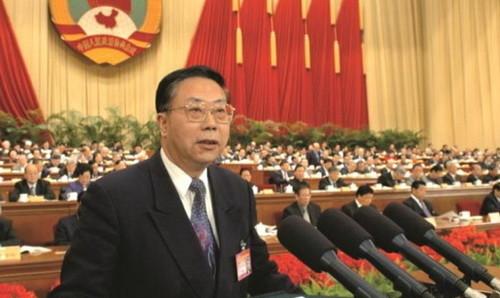Author: Li Hanqiu
In the early years, the class was opened to the Qing Dynasty, and wu barnyard and Guan Qing were devoted. (1)
The CPPCC knows its mandate to revere benevolence and righteousness, and is committed to the prosperity of the Chinese festival. (2)
In the year of The Year of The Emperor returned to Ru Lin, and the promise was passed on to the world to establish a destiny. (3)
The members are scholars, and have been called humanistic scholars. (4)

Li Hanqiu spoke at the Fourth Plenary Session of the Tenth NATIONAL COMMITTEE of the Chinese People's Political Consultative Conference.
Li Hanqiu was a guest of Guangming Network to interpret the source and cultural connotation of the Dragon Boat Festival.
concentrate:
(1) Early years from the teaching, kaiyuan Ming and Qing dynasty literature class. Studying Wu Jingzi's "History of Ru LinWai" and Guan Hanqing, several books have been published. "Guan Hanqing's Famous Drama Appreciation" can be transmitted, and the Japanese translation has been partially published.
(2) In the 20 years that he served as a member of the CPPCC National Committee from the year of knowing his destiny, he first restored the right position of Ren Yi Li Zhixin and initiated the Mid-Autumn Festival holiday of the Qingming Dragon Boat Festival, and there were dozens of books such as "Records of Li Hanqiu Carrying Forward Chinese Culture", "New Three Character Classic", "CPPCC Members Performing Their Duties Li Hanqiu", "CPPCC Member Bunko Li Hanqiu", "The Mystery of Traditional Festivals", "Sincerity, Filial Piety, Benevolence, and Justice".
(3) Rulin refers to the group of readers, and here it also refers specifically to "Rulinology". More than twenty books on Rulinology have been published, and they are intended to be passed down to the world with the series of "Basic Research on the History of Rulin's Foreign History". The listed candidates include "Review of Rulin's Foreign History School", "Li Hanqiu's Lecture on Rulin", "Wu Jingzi's Poetry Biography", "Rulin's Foreign History Research Data Integration" and so on.
(4) Synthesis, known as the humanist, fulfilled the original wish of the scholar.
Source: Guangming Network